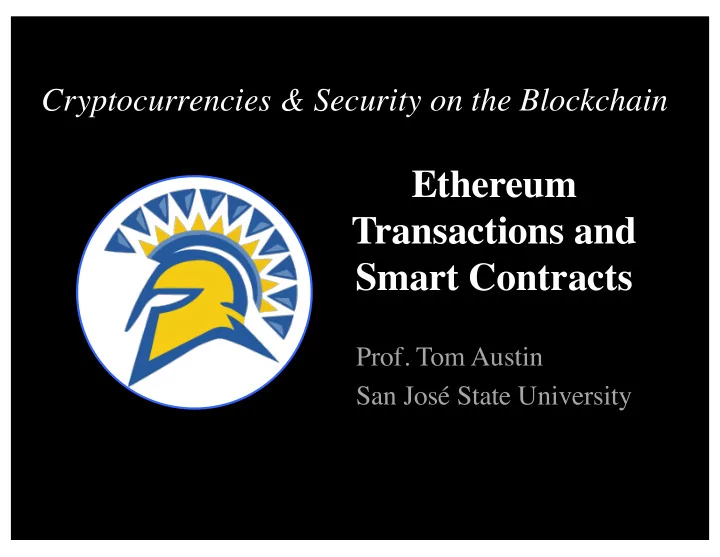

Cryptocurrencies & Security on the Blockchain Ethereum Transactions and Smart Contracts Prof. Tom Austin San José State University
Transactions
Transactions • Signed messages triggered by EOA • Atomic – If they fail, they roll back state – Gas is still lost • Flood routing protocol
Transaction Fields • Gas price • Gas limit • Recipient • Value – ether to send to the destination • Data – variable length binary data payload • ECDSA signature fields: v, r, s • Nonce
Nonce Importance • Ethereum is account-based, not UTXO-based – Simpler – Pseudo-anonymity not a major goal (still possible, just more complex). • Replay attacks are a concern • Orders transactions from account – Transactions are processed in order – If a tx fails, subsequent ones will be stuck.
TX Value and Data Payload may contain either field, both fields, or even neither. • Neither is a waste of gas, but possible. • Tx with value is a payment. • Tx with data is an invocation.
Smart Contracts
Smart Contracts (Definition from Mastering Ethereum ) Immutable computer programs that run deterministically in the context of an Ethereum Virtual Machine as part of the Ethereum network protocol—i.e., on the decentralized world computer.
Smart Contract Life Cycle 1. Published to the zero address . – 0x0000000000000000000000000000000000000000 – Author has not special rights to a contract, unless the contract is written that way. 2. Invoked by transaction. 3. May be destroyed. – Only if creator configured it that way.
High-level Languages for EVM • LLL – Lisp-like language. – Oldest, but rarely used. • Serpent – Python-ish • Solidity – JavaScript-ish • Vyper – Also Python-ish • Bamboo – Erlang-ish
High-level Languages for EVM • LLL – Lisp-like language. – Oldest, but rarely used. • Serpent – Python-ish • Solidity – JavaScript-ish • Vyper – Also Python-ish • Bamboo – Erlang-ish
Solidity • Created by Gavin Wood. • Most popular HLL for Ethereum today.
Solidity Data Types (not exhaustive) • bool • int , uint – Variants in 8, 16, 32, …, 256 – Default is 256 • fixed , ufixed • address • Arrays • Time units • Ether units: wei , finney , szabo , and ether
Global Variables • msg – the transaction call. – Fields: sender, value, gas, data, sig • tx – the transaction. – Fields: gasprice • block – the block the transaction is in. – Fields: coinbase, difficulty, gaslimit, number, timestamp (in seconds since epoch)
Constructing and Destroying Contracts • Created with constructor . – Older versions used contract name • Destroyed with selfdestruct . – Person who destroys it claims the contract's ether. – Only if enabled by author.
Function Syntax function FunctionName ([ parameters ]) {public|private|internal|external} [pure|constant|view|payable] [ modifiers ] [returns ( return types )]
Function Modifiers • Functions that modify other functions • Use an underscore (_) as a placeholder for the modified function modifier onlyOwner { require (msg.sender == owner); _; }
Function Restricting Access function takeFunds() public { require (msg.sender == owner); msg.sender.transfer(amt); }
Using Function Modifier function takeFunds() public onlyOwner { msg.sender.transfer(amt); }
Error handling • Guarantee state. – Throw an exception if false. • assert – Used only to catch internal programming errors • require – Used to validate external input – May be given 2 nd argument for better error handling
Improved Faucet Code (in class)
Lab: Distributed Lottery in Ethereum Details in Canvas.
Recommend
More recommend